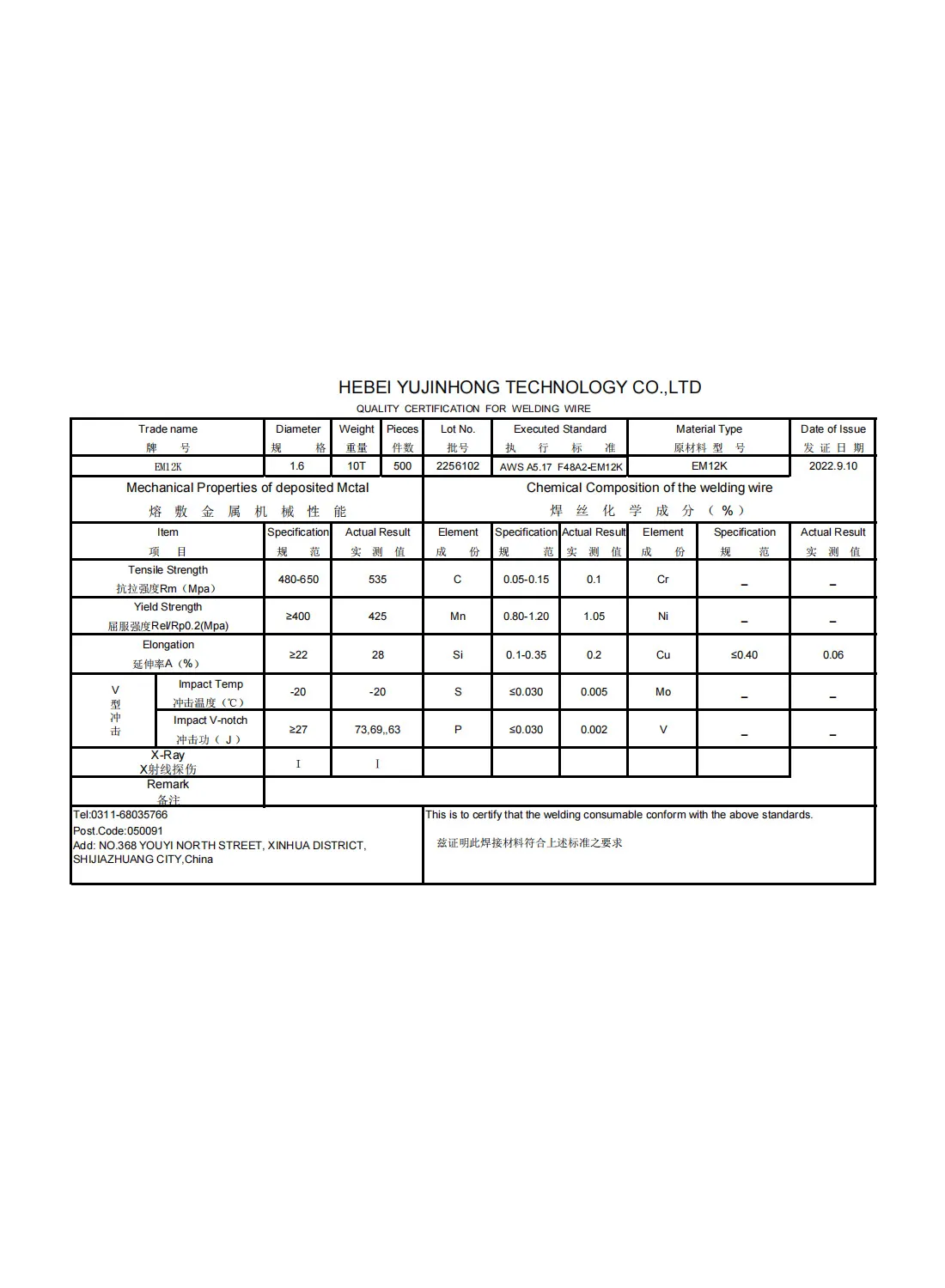Electrode Welding Rods for Enhanced Performance and Versatile Applications in Metalwork
Understanding Electrode Welding Rods A Comprehensive Overview
Welding is an essential process in various industries, ranging from automotive to construction, and it serves as the backbone for countless applications. Among the myriad tools utilized in welding, the electrode welding rod plays a pivotal role. This article delves into the intricacies of electrode welding rods, exploring their types, applications, and significance in modern welding practices.
What is an Electrode Welding Rod?
An electrode welding rod is a crucial component in the arc welding process, where it serves as both an electrode and a filler material for the weld. As the welding machine generates electric current, the electrode rod creates an arc between itself and the workpiece. The intense heat generated from this arc melts the rod, allowing it to combine with the base metal, thereby forming a strong joint.
Types of Electrode Welding Rods
Electrode welding rods come in various types, each designed for specific applications and materials. The most common types include
1. MMA (Manual Metal Arc) Electrodes These are typically used in stick welding, where the electrode is consumed during the welding process. They are versatile and can be used on a wide range of materials, including steel, stainless steel, and cast iron.
2. TIG (Tungsten Inert Gas) Electrodes Although primarily made from tungsten, these electrodes can work in conjunction with filler rods. They are known for their precision and are ideal for welding thin materials and providing high-quality seams.
3. MIG (Metal Inert Gas) Welding Wire Often referred to as solid wire electrodes, these are continuously fed through a welding gun. MIG welding is favored for its speed and ease of use, making it popular in production environments.
4. Flux-Cored Electrodes These rods contain a core of flux that aids in shielding the weld from contaminants. They can be used in various welding processes, including MIG and MMA, and are known for their ability to weld in windy conditions.
electrode welding rod

Applications of Electrode Welding Rods
Electrode welding rods have a wide array of applications across various industries. In construction, they are used for fabricating structural steel frameworks. The automotive industry relies on them for assembling vehicle parts, ensuring safety and durability. Additionally, electrode rods are integral in shipbuilding and repairs, as well as in manufacturing heavy machinery and equipment.
One of the major advantages of using electrode welding rods is their adaptability. The rods can be used on different materials and thicknesses, providing welders with the versatility needed for various tasks. For instance, specialized rods are available for welding galvanized steel, aluminum, and even dissimilar metals, facilitating a broad range of projects.
Selecting the Right Electrode Welding Rod
Choosing the correct electrode welding rod is crucial for achieving optimal results. Factors to consider include
- Material Compatibility The rod must be compatible with the base metal being welded. For instance, using the appropriate electrode for stainless steel is critical to prevent corrosion and ensure a strong bond.
- Welding Position Different rods are suited for various welding positions, such as flat, horizontal, vertical, or overhead welding. Selecting the right rod can enhance stability and improve the quality of the weld.
- Shielding Gas Requirement Some electrode rods require specific shielding gases for effective welding. Ensuring proper gas flow is essential, particularly in MIG and TIG welding processes.
Conclusion
Electrode welding rods are indispensable tools in the welding industry, providing effectiveness and versatility for various applications. Understanding the different types and their appropriate uses can significantly enhance welding quality and efficiency. As technology continues to advance, the development of new electrode materials and applications will undoubtedly shape the future of welding, making it an exciting field for engineers, technicians, and DIY enthusiasts alike. Whether in a professional setting or a hobbyist workshop, mastering the use of electrode welding rods can lead to stronger and more durable welded structures.
-
Best MIG Welding No Gas Flux Core Solution – Easy, Portable & Clean WeldingNewsJul.08,2025
-
7018 Welding Rod 3/16 - High Strength, Low Hydrogen Electrodes Wholesale 3/32 Welding Rod 7018 Suppliers & China 7018 AC Welding Rod FactoryNewsJul.08,2025
-
High Quality MIG Aluminium Welding Wire - Wholesale Factory Prices from China SuppliersNewsJul.07,2025
-
High-Quality Gasless Aluminum Welding Wire China Gasless Aluminum MIG Wire SupplierNewsJul.07,2025
-
High Quality Ordinary Welding Rod for Pipes – Reliable China Welding Rod 7016 SupplierNewsJul.06,2025
-
Welding Wire 0.9 mm ER70S-6 Supplier Wholesale Manufacturers & FactoriesNewsJul.06,2025


